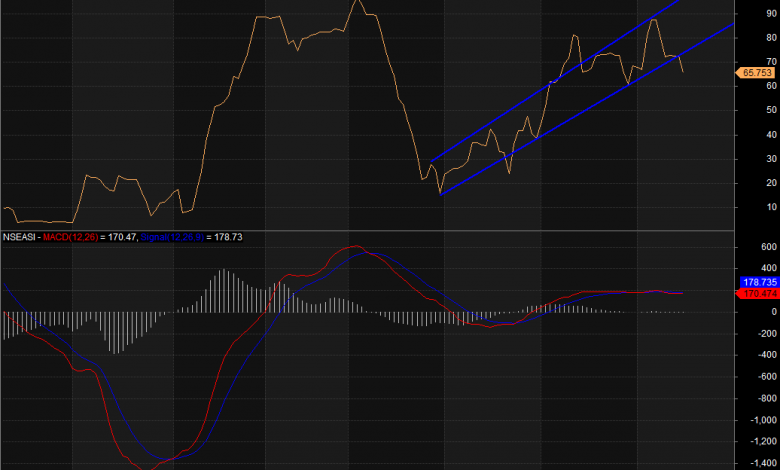Published
4 years agoon

By Investdata Analysts
After sessions of marginal gains, the benchmark All-Share index of the Nigerian Stock Exchange (NSE) turned negative on Tuesday when trading was mixed and volatile on mixed sentiment and high traded volume.
This was occasioned by profit booking in oil, banking and consumer goods stocks which dragged the index down, even ahead of the oncoming price adjustment in the shares of UBA, Stanbic IBTC and Guaranty Trust Bank for interim dividends of 17 kobo, 40 kobo and 30 kobo respectively recommended by their boards.
There was also the late decline in the market’s money flow index to 65.75 points, from the previous day’s 72.51 points, reflecting the effect of profit taking and investors’ concern about the government’s economic policies in the midst of a clear lack of coordination among the policy makers. The day’s decline also coincided with the release of the Consumer Price Index or inflation data for the month of August, which put a lie to the recent statement by the Federal Government’s claims that commodities prices are on the decline.
August consumer price index released Tuesday by the National Bureau of Statistics (NBS) revealed a strong spike in inflation at 13.22% from the previous month 12.82%, reflecting the glaring impacts of the mismatch policies, high cost transportation, and the heightened insecurity that has affected farmers. These is besides the low produce resulting from climate change and the incessant increase in fuel price before the recent hike in the name of full deregulation and removal of subsidy on petrol.
Technically, as mention in our previous update, the market is entering a distribution phase that signals reversal of trend which would be confirmed in the next trading session, as profit taking is underway. The decline was despite the seeming reversal in oil prices in the international market on Tuesday.
We noticed recently that foreign or institutional investors in the following companies like Unilever, Nigerian Breweries, Nestle, Guinness, Stanbic IBTC and Flourmills have increased their stake with their dividends which they had difficulty repatriating due to hitches at the exchange market. It is expected that price correction in these stocks is imminent, given that the expected Q3 earnings report may not support the current price levels.
Meanwhile, Tuesday’s trading started on the downside and oscillated throughout on profit and position taking in low and medium cap stocks which pushed the NSE index to an intraday low of 25,573.96bps, from its high of 25,618.65bps. Thereafter, it closed below the opening figure at 25,597.96bps on a negative breadth.
The session’s market technicals were weak and mixed, with volume lower than the previous session’s in the midst of a negative market breadth and mixed sentiments, as revealed by Investdata’s Sentiment Report showing 54% ‘buy’ volume and sell position of 46%. Total transaction volume index stood at 1.04points, just as the impetus behind the day’s performance remained relatively strong, with Money Flow Index reading 65.75. points, from the previous day’s 72.52points, an indication that funds left the market to reflect profit taking.
Index and Market Caps
The key performance index at the end of Tuesday’s trading shed 7.63bps, closing at 25,587.96bps, after opening at 25,605.59bps, representing 0.03% drop, just as market capitalization fell by N3.98bn to N13.35tr, after opening at N13.36tr, also representing a 0.03% value loss.
The day’s downturn arose from selloffs and profit taking in Seplat, FBNH, UBA, ETI, Dangote Sugar, Oando, Redstar Express, NPF Microfinance and Fidelity Bank, among others, which impacted mildly on the index as it increasedYear-To-Date loss to 4.63%, while market capitalization YTD gain dropped to N400.45bn, representing 3.02% above the year’s opening value.
Mixed Sector Indices
The sectorial performance indexes were largely bearish, except for the NSE Insurance and Industrial Goods that closed by 0.35% and 0.21% higher respectively, while the NSE Oil/Gas led the decliners by 1.16% down, followed by Banking and Consumer Goods indexes that shed 0.18% and 0.10% respectively.
Market breadth was negative as decliners outpaced advancersin the ratio of 15:13, with activity in term of volume and value were down by 4.63% and 9.25% respectively, after traders crossed 245.14m shares worth N3.01bn, as against the previous day’s 257.03m units valued at N3.32bn. This was boosted by trades in FBNH, Guaranty Trust Bank, Zenith Bank, Stanbic IBTC and Access Bank.
Ikeja Hotel and UACN Property were the best performing stocks after gaining 9.52% and 9.20% respectively, closing at N0.94 and N0.95 per share on market forces. On the flip side, NPF Microfinance and Union Diagnostic lost 9.42% and 7.41% respectively, closing at N1.25 and N0.25 respectively on profit taking and market forces.
Market Outlook
We expect profit booking and positioning ahead of qualification and markdown dates for dividend paying banks, given that the August inflation data came worse than expected at 13.22% to deepen the negative returns of many investment window. Recall that banks have kept the market above its 50-day moving average on a daily time frame, which is equally at overbought zone in the short term.
The mixed intraday movement is likely to persist as the month of September progresses in the midst of profit booking, mismatch economic policies and negative macroeconomic indices. This is also against the backdrop of the fact that the capital wave in the financial market may persist in the midst of relatively low-interest rates in the money market, high inflation, negative Q2 GDP of 6.1% and unstable economic outlook for the rest of 2020 as government and its economic managers are going front and back with mismatch polices and implementation.
Also, investors and traders are positioning amidst the changing sentiments in the hope of improved liquidity and positive economic indices which may reverse the current trend.
We see investors focusing on portfolio adjustment and rebalancing by targeting companies with strong potentials to grow their Q3 earnings and dividend on the strength of their earnings capacity as the year last quarter is at the corner.
Again, the current undervalue state of the market offers investors opportunities to position for the short, medium and long-term, which is why investors should target fundamentally sound, and dividend-paying stocks for possible capital appreciation for the rest of the year.

Ambrose Omordion, Chief Research Officer, InvestData Consulting Limited














